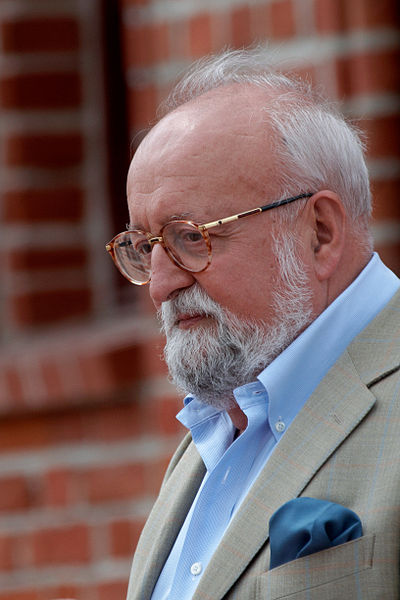Penderecki, Agnus Dei

The Polish composer Krzysztof Penderecki (pen-de-RETsk-i) died last year. Born in 1933, he spent much of his life behind the Iron Curtain and much of his output was in the form a sacred music.
Penderecki’s music was all the rage when I was an undergraduate. We were being schooled in the avant-garde, if such a thing is possible, and Penderecki was in the forefront. His Threnody for the Victims of Hiroshima brought him international acclaim. It is a very powerful piece, filled with tone clusters and unconventional methods of getting sound out of instruments. But then, it is about unconventional warfare.
I found his choral music more compelling, in particular Utrenja: the Entombment of Christ. That work, and also his St. Luke Passion, incorporated more traditional elements that brought some coherence to his modernism. Choral works also by their nature have an inherent connection to human expression and always seemed to me much more fertile ground for creating new music.
Penderecki later abandoned the avant-garde and turned to a more traditional musical language in the mid 1970s. He explained:
The avant-garde gave one an illusion of universalism. The musical world of Stockhausen, Nono, Boulez and Cage was for us, the young – hemmed in by the aesthetics of socialist realism, then the official canon in our country – a liberation…. I was quick to realise however, that this novelty, this experimentation, and formal speculation, is more destructive than constructive.
The Agnus dei, dedicated to Cardinal Stefan Wyszyński, was written in 1981 as part of his Polish Requiem. The Polish Requiem began as a commission from the trade union Solidarity to memorialize those killed in anti-government protests. The Lacrimosa dedicated to Lech Walesa was gradually expanded into the full Requiem.
Some of what you hear in this Agnus dei may sound quite modern, especially if you are not comparing it to Penderecki’s earlier works. But it is quite traditional in most respects. If it does not speak to you on the first listening, I predict it will with a few repetitions.
Photo: Adam Kumiszcza (CC BY-3.0)



